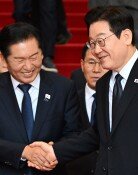Gov’t should stop sitting on the fence on pension reform
Gov’t should stop sitting on the fence on pension reform
Posted September. 04, 2023 08:52,
Updated September. 04, 2023 08:52
Regarding the National Pension Financial Calculation Committee’s pension reform plan to ‘pay more and receive at a later age,’ Minister Cho Gyu-hong of Health and Welfare said that the government plan to be submitted to the National Assembly next month will place weight on ‘public acceptance.’ In a televised appearance two days ago, Minister Cho replied that the plan was “basic data created by the committee” and that “public acceptance was more important than rationality” when remarks were made that the plan did not include any reform on increasing the income replacement rate (pension received). This suggests that the income replacement rate may be raised to gain public consent despite the risk of deteriorating financial outlook for the longer term.
Such remarks raise doubts about the government’s intention for reform, which had been a difficult step forward. In its reform plan, the committee set its fiscal goal to “avoid fund depletion by 2093.” For example, this is to ensure that a 20-year-old who joined public pension this year will receive a stable pension until the age of 90, the average life expectancy. The committee presented 18 reform scenarios but was narrowed down to 5 based on the goal, including the plan to raise the insurance premium rate (the amount paid) to 15% and receive a pension from the age of 68. Is the minister’s remark suggesting that the committee will go back to the drawing board with the options it narrowed down over 20 rounds of meetings?
The income replacement rate for Korea’s public pension is lower than that of other advanced countries. The reason why the committee ruled out the increase is that it would place too much burden on future generations. If the income replacement rate is increased from the current 40% to 45-50%, the fund will be depleted by 2054. If the system is reformed to give out pensions based on the funds collected in the same year, the premium rate will soar to 37% in 2093. This means that 1.11 million won, out of a monthly income of 3 million won, will be deducted from pay slips to pay out premiums for senior citizens. The purpose of pension reform is to prevent fund depletion and ease the burdens of future generations. Passing the burden of insurance premiums on to the next generation out of fear of public opposition is not reform at all.
The previous government also failed to execute pension reform on the grounds of “paying attention to public opinion,” causing the fund depletion period to be advanced by two years to 2055, increasing premiums to the 30% range. With dwindling birth rates and aging population, the number of people paying insurance premiums will drop by 860,000 by 2027, while the number of people receiving insurance will increase by more than 2.4 million, with pensions expenses expected to exceed income. While the government continues to take a back seat in reform and retaining a 9% premium rate, which is less than half of the average (18.3%) of OECD countries, for 25 years, the public burden, as well as generational conflict surrounding pension reform, will only increase.





![트럼프의 그린란드 병합 의지, ‘이 사람’이 불씨 지폈다[지금, 이 사람]](https://dimg.donga.com/c/138/175/90/1/wps/NEWS/IMAGE/2026/01/20/133193287.1.jpg)

